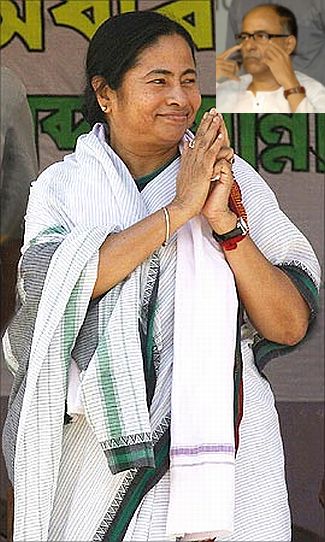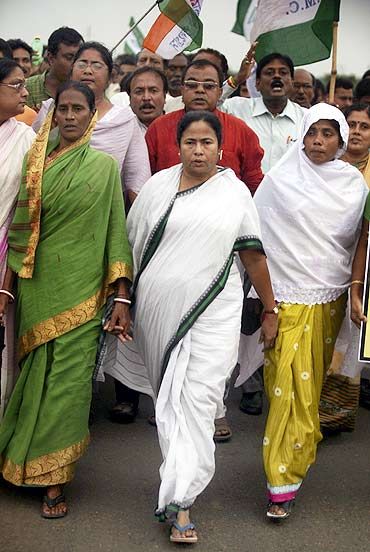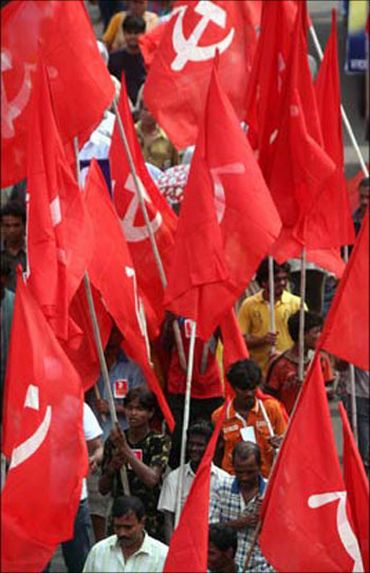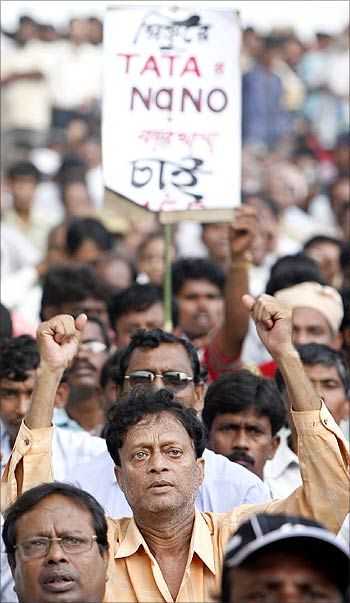Sumit Bhattacharya
If Mamata Banerjee is a fighter jet bombing the Left Front fortress of West Bengal, Gautam Deb is the Communist Party of India-Marxist's anti-aircraft gun.
Deb, 58, the state housing and public health minister, has emerged as the ruling CPI-M's chief spokesperson in the run-up to Bengal's battle royal, the six-phase state assembly elections that begin April 17.
On Tuesday, he took on Trinamool Congress supremo Banjerjee -- who has been garnering banner headlines with her padayatras -- in a televised and rare press conference at the CPI-M headquarters on Alimuddin Street, Kolkata.
Armed with an iPad and sitting below framed photographs of Karl Marx, Friedrich Engels, Lenin and Joseph Stalin, Deb made a DVD presentation refuting what he called Banerjee's lies.
Deb, who is among the CPI-M's top guns along with Biman Bose and Chief Minister Buddhadeb Bhattacharjee, reeled out statistic after statistic to demolish Banerjee's claims. The presentation contained clips of Banerjee's interview to a television channel, juxtaposed with facts and figures.
She had lied that the Rs 2 per kg rice scheme for below poverty line families was the Central government's scheme, Deb declared. He said the central government gave rice to such families at Rs 5.65 per kg, and the Rs 2 figure was because the West Bengal government's subsidy.
Among the most serious allegations Deb hurled at Railway Minister Banerjee -- alongside snide remarks about her accent, etc -- was that she had lied in Parliament about the Railways constructing 710 km of new railway lines. The actual figure was 59 km, he said, and she faces a privilege motion in Parliament about this.
He also said Banerjee had lied about giving 180,000 people jobs in the Railways, had fudged figures to somehow present the railway budget, and dared Banerjee to reply.
Minutes before the press conference, in his car, Deb spoke to Rediff.com's Sumit Bhattacharya about the CPI-M's own soul-searching.Click on NEXT to read the interview...
'This should be the toughest election for the Left'
Is this election the toughest the Left has faced in West Bengal?
Indeed.
Why?
Because since 1967, for the last 42 years, we have been facing innumerable elections. Except the elections in 1972, which we dubbed as a rigged election and we boycotted the whole of the election tenure, we never lost any election. But we tasted the loss, both in terms of votes and seats, in the 2009 Lok Sabha elections, which was 100 percent a political election unlike local body elections where other local issues are juxtaposed along with the national and international issues.
Because we lost that election heavily, coupled with our marginal loss in the panchayat elections in 2008, and again in 2010 our considerable loss in civic body elections, it simply appears that the 2011 elections should be the toughest one for the Left.
How do you account for the rise of Mamata Banerjee? How did the CPI-M end up losing so much political space to the Trinamool Congress?
Trinamool has got the space from the Congress. Not from the CPI-M. Because if you see the political arithmetic, then for the last 34 years, the Left more or less could have maintained their popular support base. In one election it has increased, in another election it could have little bit decreased, but more or less, the Left could have maintained its popular base. So what has happened actually, the Congress has lost its popular base, and that space has been acquired by the Trinamool Congress.
But was the Congress ever (in the over three decades of Left rule) as strong as the Trinamool is now (in West Bengal)?
Yes, from 1977 to 1998. The Trinamool was born in 1998. Even after the birth of Trinamool, the Congress could have retained sizable votes in some elections. But gradually, as it is happening elsewhere in the country, the Congress failed miserably to retain its votes. And as the (Trinamool) party is the offspring of the Congress -- more or less the same people -- it got the strength at the expense of the Congress.
Then why is the Left so worried?
We are worried because in the last elections, what has worried us, what has never happened (has happened) First, a sizable desertion of the voters of the Left camp occurs in a Lok Sabha poll. And that was added with the prevailing Congress-Trinamool combination's votes. And that makes a figure.
'There are some black sheep in CPI-M'
So there has obviously been an alienation of the party from the masses.
Yes.
What are the reasons?
We have identified three reasons.
Number one: political. During the time of the Lok Sabha poll, the slogans we have raised -- the main plank of the elections -- it was a three-pronged slogan we raised before the nation: Ensure the defeat of the Congress, ensure the defeat of the BJP (Bharatiya Janata Party), and ensure a government of the Third Front.
But in hindsight, when we met in the (CPI-M) central committee, we self-critically came to the conclusion that particularly the third part, that is to cast your vote in favour of the Third Front to form a government, does not raise any confidence in the people or doesn't carry any credibility.
So, we thought we should have dropped the term 'government'. Instead of asking the people to form a government of the Third Front we should have asked the people to ensure the win of the Third Front candidates. So that the option is open after the elections how the new combination of the government -- whom we can support, who can support us, that could have been kept aside.
But straightaway to ask for the defeat of this and ensure a Third Front government seems a little faulty.
Number two: organisational. Some rectification is needed -- in the work style, in the behavioural pattern, in maintaining the uniqueness in the characteristics of the Leftists. What is counted as the main strength of the Left -- their honesty, their integrity, their sincerity, their affection for the people. That type of comrades are still huge in numbers.
But there are some black sheep who have managed their inroads (into the CPI-M), which has annoyed the people. So they (the people) have given their alert signal to the Left. As we are saying, this is no victory of Mamata, this the defeat of the Left.'A wrong message has been sent'
The third reason is our government's performance.
Notwithstanding the fact that we have been implementing a host of projects for the people, particularly for the poorest of the poor -- like land distribution, share croppers, so on and so forth -- but in the last couple of years, our aggressive posture for industrialisation, including the land acquisition in Nandigram and Singur -- particularly Nandigram, as we consider a wrong procedure was adopted (to acquire land), followed by police firing, which also could have been avoided -- an impression has been created, particularly among a section of the people or the supporters of the Left, that how far Left is Left anymore.
Whether they are abandoning their age-old friends instead of preferring the new friends, the Tatas, the Jindals...
But that is inevitable, isn't it?
That is inevitable, but it could have been sold in a better way. The packaging was not (good enough).
Because we understand even the poorer people are not against investment from foreign countries. They are not against investment from the Tatas. They understand that unless and until investment is coming, the factories will not be started, employment will not be generated, revenue will not be enhanced.
So it (wooing investors) is a must. But what has hurt them, (is) the Left's concentrated and priority should be on the poorest of the poor. Keeping that intact, you go for five star hotels, for malls, for Big Bazaars, for flyovers, for new towns, for deluxe buildings -- there is no harm in it. But the harmonious development keeping the central point (must be) on the poorest of the poor. Because the country mainly consists of the poorer people. A wrong message has been sent.
So these reasons together have caused some desertions, which we have identified. We are trying to rectify it.'People condone one or two faults if they see you are always available'
Image: WB Chief Minister Buddhadeb BhattacharjeeEven the harshest critics of the Left Front admit that top-level corruption -- like a 2G scam for example -- is less in the West Bengal government. But the rot in the lower levels, which is the face of the party, is also irrefutable. What is your explanation?
Even the businessmen consider West Bengal as the least corrupt state in the country. Even the businessmen who used to bribe the people in Delhi and Bombay, it is their own admission. At the lower rung, huge corruption is not the problem but particularly behaviour Jyoti Basu used to keep saying, 'Keep living in contact with the people'. People can even condone your one or two faults if they see you are always available at their (hour of) need.
Don't disconnect the connectivity with the people. Don't do any high-handedness. Don't try to lord over the people. That type of activities, little overlording the people, dictating the people, misbehaving with the people
Say for example, if they have voted for the opposition, you, you are the ruling party; they might come to you for many problems. You attend (to) them, and do whatever best you can. Whether he will reciprocate politically (by voting for you) that is his matter but (you must do) your part That has not been forthcoming in all the cases.
So, that fault we admit. I must not be partial or rude to our lower-rung people; this type of deviations from the party rules or party standards has occurred even in the middle or the top level also.
So, we have to ensure rectification takes place at every level, not stop at the lower rung. But lower is important, as you have rightly pointed out, that they are the face of the party. So, that hurts the people directly.
But the party doesn't stop over there. A middle-ranking leader, he is controlling the lower cadres; what was he doing? In some cases, we see that he has indulged those persons. So, he may not be in direct contact with the people but he is the man who should be taken to task.
How many seats will the Left front win?
We will form the government. Day by day, it is improving.






article